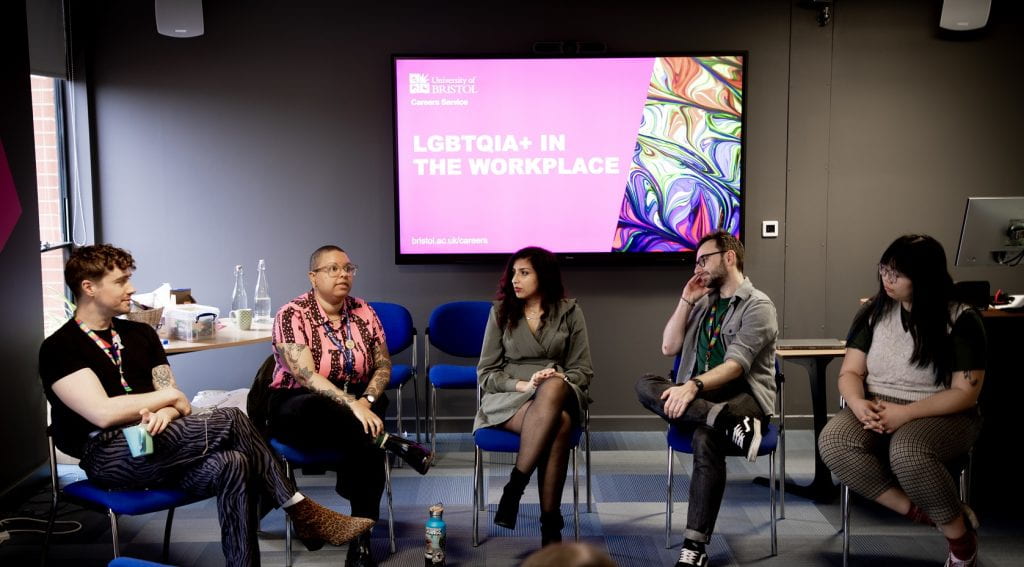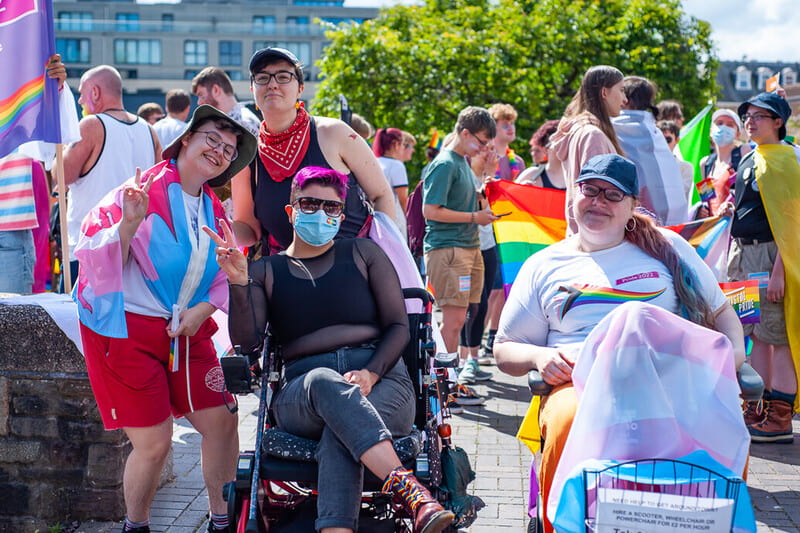As part of LGBT+ History Month, the Careers Service hosted a panel event exploring what it’s like in the workplace for LGBTQIA+ individuals.
The event connected current students with speakers from the LGBTQIA+ community who work in a variety of different sectors, allowing those who attended a chance to hear stories and advice, and ask questions.
Our panel included –

- Cassie Agbehenu (she/her or they/them) – Director of Impact and Influence, Bristol Students’ Union
- Dr Jo Hartland (they/them) – Senior Lecturer, Bristol Medical School
- Mateusz Lipinski (he/him) – Business Analyst, Deloitte
- Yiran Liu (she/her) – Audit Associate, Deloitte
- Raeesa Rajmohamed (she/her) – Barrister, Academic Writer and Human Rights Implementation Centre Advisor
Here are their key tips for LGBTQIA+ people to thrive in the workplace.
You’re interviewing a workplace as much as they’re interviewing you.
If you are looking to work for an organisation that is LGBTQIA+ friendly, you can use your interview to find out what it’s like to work for them. For their interview at the SU, Cassie was asked how they would handle a report of transphobia. This showed them that the organisation prioritised the experiences of their trans stakeholders and wanted to employ people who could make this happen.
If you feel comfortable doing so, you can also ask the panel questions that relate to your LGBTQIA+ identities. This could be about colleagues’ experiences in the workplace or the support available when accessing gender-affirming healthcare, for example.
The panel also said that, if you find during an interview that a role or an organisation is not right for you, you can withdraw from the recruitment process. However, they also recognised that it can be a position of privilege to be able to do this. And if you do find yourself in a negative workplace, it doesn’t have to be forever. You can use the experiences you are getting to develop yourself and work towards another job in the near future.
Finding community is key.
Everyone on the panel enthused about the importance of finding a community of people who understand what you’re going through. Lots of large companies have LGBTQIA+ staff networks to bring queer colleagues together and Mat talked lots about his experiences running the Bristol and Cardiff branch of Deloitte’s Proud Network. He organises lots of events and activities bringing together colleagues from the two regional offices to build a sense of community that can support one another.
Lots of organisations don’t have staff networks, but there are plenty of other places to find a community. Yiran is involved with Bristol Queer People of Colour Socials, which brings together queer and trans people of colour in Bristol to build a local community. Cassie talked about similar networks existing within trade unions, allowing LGBTQIA+ individuals to find a national community of professionals in their field. Raeesa also used InterNations and The Queer Muslim Project to find a community when working abroad.
There are other ways to look after yourself in challenging environments.
Your supervisor, a trusted superior, or a colleague in HR can be great places to turn if you find yourself in a challenging situation at work based on your LGBTQIA+ identity. Some workplaces also offer employee assistance programmes, where you can get access to trained counsellors to talk to.
If you need to talk to someone outside of your company, the panel highlighted that they could turn to their friends, family or found family. When Jo was working on a project that received a lot of national attention, they had conversations with their loved ones about what might happen and the support they needed, helping them through difficult situations.
In the face of challenging environments, Raeesa also stressed the importance of choosing one’s battles wisely. It does not make anyone a lesser member of the LGBTQIA+ community or any less of an ally or activist if they do not choose to defend every single form of discrimination they encounter. Sometimes, it is more important to prioritise one’s safety than speak out. Jo drew from personal experience regarding environments where they did not feel safe and recognised that those situations could have been even more dangerous if there had been other elements of intersectionality. They both stressed that self-care and mental health are vital and should never be compromised.
There are allies everywhere, even if they aren’t able to speak up.
When sharing a story about being an LGBTQIA+ person in the workplace, Raeesa talked about her time lecturing international law in the Gambia and giving a lecture on LGBTQIA+ rights. Despite the country’s criminalisation of LGBTQIA+ activities and people, seeing some of her students still so passionately advocate for LGBTQIA+ rights was inspiring.
Although only half of the students in the lecture hall were supportive of queer rights and equality, events following her lecture stood out. She started receiving emails and office visits from many of the students who opposed queer rights during the lecture. They privately revealed their LGBTQIA+ allyship and explained how they just didn’t feel comfortable or safe advocating publicly. Additionally, no students reported her for this lesson. Seeing a new generation of Gambian lawyers becoming increasingly supportive of LGBTQIA+ communities was heartening. She holds the experience close to her heart and as a reminder that there is still progress happening in the world.

Being LGBTQIA+ is an asset, not a problem.
Everyone on the panel found being LGBTQIA+ was a positive to their role. Jo and Raeesa both brought their experiences into their teaching. Cassie outlined how members of their team valued having a queer manager and that they could be a positive role model for their team. Yiran also talked about how Cassie’s work drove her to want to make a difference in the workplace. Mat felt he was able to thrive in his role by allowing himself to be himself at work.
Support for LGBTQIA+ students
There’s lots of support for LGBTQIA+ students available in the University and the SU –
- Read more about our support for LGBT+ students on our website.
- Talk to LGBTQIA+ career experts via Bristol Connects.
- Join the LGBTQ+ Society, LGBT Network and the Trans Network in the SU.
- Drop into the Careers Service to speak to a member of the team about any careers queries. We are open 10 am to 4:30 pm during term time.
- Your school or department may have an equality, diversity and inclusion committee that may be able to help with issues you are facing on your course.
- You can still access support after you graduate.

